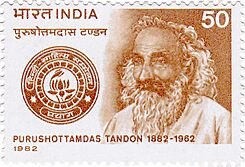Purushottam Das Tandon facts for kids
Quick facts for kids
Rajarshi
Purushottam Das Tandon
|
|
|---|---|
 |
|
| Born | 1 August 1882 |
| Died | 1 July 1962 (aged 79) |
| Occupation | Politician |
| Political party | Indian National Congress |
| Awards | Bharat Ratna (1961) |
Purushottam Das Tandon was an important freedom fighter from Allahabad, Uttar Pradesh, India. He was born on August 1, 1882, and passed away on July 1, 1962. People remember him for two main things. First, he was against the idea of dividing India. Second, he worked hard to make Hindi an official language of India.
He was often called Rajarshi, which means "Royal Saint." This special title showed how much people respected him. He was also known as UP Gandhi. In 1961, he received the Bharat Ratna, which is India's highest award for civilians.
Contents
Early Life and Education
Purushottam Das Tandon was born in Allahabad into a middle-class family. He studied hard and earned a law degree. He also got a Master's in history.
In 1906, he started working as a lawyer. He joined the Allahabad High Court in 1908. But in 1921, he decided to stop practicing law. He wanted to spend all his time working for the public and for India's freedom. He also taught Hindi at Victoria College in Gwalior for some time.
Fighting for Freedom
Purushottam Das Tandon joined the Indian National Congress very early, in 1899, when he was still a student. In 1906, he represented Allahabad in the All India Congress Committee. He was part of the Congress Party committee that looked into the terrible Jallianwala Bagh incident in 1919.
He was arrested many times for taking part in freedom movements. This included the non-cooperation movement in the 1920s. He was also arrested during the Salt Satyagraha in the 1930s. He was even arrested before Mohandas K. Gandhi returned from London in 1931.
Tandon ji was well-known for helping farmers. He served as the President of the Bihar Provincial Kisan Sabha in 1934. He also led the Servants of the People Society, a group that did social work.
From 1937 to 1950, he served as the Speaker of the Legislative Assembly in what is now Uttar Pradesh. This was for 13 years. In 1946, he was chosen to be a member of the Constituent Assembly of India. He was a very important leader for India.
After India Became Free
After India gained independence, Purushottam Das Tandon continued his work. He tried to become the President of the Congress Party in 1948 but did not win. However, he successfully won the election in 1950. He became the president of the Congress Party during its Nagpur session.
He later resigned from this post. This was due to some disagreements with Jawaharlal Nehru. Nehru's popularity was very important for winning elections. So, Nehru also became the president of Congress in 1951 and 1952.
In 1952, Tandon ji was elected to the Lok Sabha. Then, in 1956, he was elected to the Rajya Sabha. After this, he retired from public life because of his health. In 1961, he was honored with the Bharat Ratna, India's highest civilian award.
Interesting Stories About Him
- A Speaker is supposed to be fair and not take sides. They usually don't go to their party meetings. But Tandon ji did. He believed he could keep his roles separate. When people asked him about it, he offered to step down if anyone didn't trust him. No one asked him to leave.
- He strongly believed in ahimsa, which means non-violence. Because of this, he started wearing rubber chappals (sandals). He did this to avoid using leather, which comes from animals.
- Once, when he was a Member of Parliament, he went to collect his salary. He asked the clerk to send the money directly to a "Public Service Fund." The officials were very surprised by his kindness. A colleague asked him why he was donating his whole salary. Tandon ji explained that his seven sons earned enough to support their families. Each son sent him money, and he only spent a small part of it. The rest, including his MP allowance, he gave to charity. This simple and selfless way of living is why he was called a "Rajarishi."
- Mahatma Gandhi himself lovingly called him Rajarishi.

